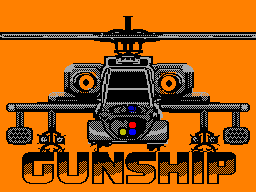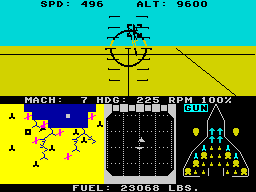
Known only to Spectrum owners through their first releases, Gunship, F15 Strike Eagle and Silent Service, Microprose are something of an unknown quantity. CRASH visited their UK headquarters for some inside information.
In the summer of 1982, Sid Meier, systems analyst, and Bill Stealey, US Air Force Academy graduate, met at a company meeting in the MGM Grand Hotel at Las Vegas. As they both had a keen interest in flying, the two hit it off and were soon challenging each other in aerial combat on a video game called The Red Baron; the former fighter pilot lost! The same Red Baron machine now sits in a corner of their Product Development department in Hunt Valley, Maryland: a present from the employees to the two co-founders of MicroProse Inc.
“Gunship cost four million dollars and took over 17 man years to develop...”
From their early friendship, a huge international company has grown: there are MicroProse offices in England, France and Japan plus a newly-opened site in Germany. The UK sector is directed from the Tetbury offices in Gloucestershire. Nestling in the centre of this historic market place, MicroProse UK looks decidedly out of place; a red banner of foot-high letters across the large glass frontage emphasises the contrast.

In addition to UK operations, 40% of their world wide transactions are controlled from here. The site includes a playtesting section, a comprehensive computer-controlled telesales department and a 20,000 square foot warehouse to back up their distribution service, which shifted over a million units last year.
Although they are the heads of a large international company, Bill Stealey and Sid Meier still play important roles in the production of each MicroProse game. Both are heavily involved in design and even playtesting. Bill holds a product development meeting three times a week and plays their games for around two hours every night. It is not unknown for him to cancel a project if he does not feel that it is up to their usual standards; only a few months ago, a space trading/combat simulator was canned after two years’ development work and a limited advertising campaign in America!
“MicroProse promise support for the Spectrum for at least the next two years...”
Although the majority of their products are developed in America, MicroProse have embarked on an extensive expansion programme in Europe. They distribute the Suncom range of joysticks and have recently joined forces with Origin systems in order to market their entire range of fantasy and role-playing software in Europe, including the Ultima series. The American label Cosmi is also to come under the MicroProse banner, and while MicroProse will continue to distribute American software, they are also looking for quality Japanese products to sell.
The American section has recently taken on the services of Gene Lipman — the founding President of Atari — who has strong coin-op links. Gene is the Vice-President of special projects, and it is rumoured within the industry that this is the first step on the road to coin-op production. They are also continuing research into CD ROM.
Closer to home, MicroProse promise support for the Spectrum for at least the next two years — that’s how long some of their projects take to prepare! They are also behind the +3; all their current and forthcoming projects are to be released on three-inch disk.

The success of Microprose products — over one million multi-format copies of F15 Strike Eagle have been sold worldwide — is often attributed to the high quality of their games and packaging. But criticisms are also levelled at the accompanying price. Stewart Bell, managing director of the UK operation, justifies the cost with some heavy statistics: ‘Gunship cost four million dollars and took over 17 man years to develop (the end product was actually one and a half years late). The final packaging and documentation is of a very high quality and is always well researched.
‘Many companies release a product and then forget about it. Microprose’s product development is a constantly ongoing process which lasts between one and two years. Project Stealth Fighter is currently in its eighth version, utilising faster algorithms and improved gameplay, while the latest version of the CBM 64 Pirates! has animated pictures.

One or two of the Microprose games stored in their 20,000 sq ft warehouse
‘The extensive technical support offered to customers is also covered by the cost. Customer service is an important aspect of MicroProse’s business — once a product is finished, a full back-up service is available to customers who can phone our helpline at any time to ask for information regarding play and equipment.
‘MicroProse also award certificates to high scores on their games. Winners of the Congressional Medal of honour on Gunship are to be presented with a certificate, signed by Bill, and treated to a part as well as a flight in Bill’s T28 fighter plane!
With such an expensive initial outlay, how do they combat piracy? ‘We rely on the packaging and the large amount of documentation to put off prospective software pirates; no-one wants to photocopy a 150-page booklet! We prevent early versions of programs from getting out by creating the individual components of the game separately. All the components of each game are then put together just before the last mastering before duplication. This way no ‘complete’ game can hit the streets before sales. However, the amount of piracy in certain countries has limited distribution. Italy and Spain are simply not worth exporting to.’
“Silent Service deals with attacks on Japanese shipping, yet this simulation is one of our biggest exports to Japan.”
Further critique involves the militaristic and often jingoistic tone associated with MicroProse games. This is dismissed with equal verve: ‘We’re all young boys at heart. Everyone wants to fly and the realism afforded by the combat scenarios only helps to heighten the excitement; if the simulation was boring you simply wouldn’t buy it.
‘Bill lost a lot of friends in Vietnam and he is careful not to glorify death in our products. When you lose a highly decorated pilot in Gunship, the loss you feel is real; the experience teaches you about life and yourself.
‘Although we do take the American viewpoint of freedom and liberty, it is important to stress that each program is simply a simulation which allows the player to see how he would fare in actual events which have, and still are, taking place. In fact, there’s a strange irony in the approach to our products: Silent Service deals with the attack of American submarines on Japanese shipping, yet this same simulation is one of our biggest exports to Japan.
‘And to be fair, we do cover both sides of the coin: our air traffic control program (CBM 64) puts the player in the position of saving lives rather than the contrary.’
We would have spoken to ‘Wild’ Bill Stealey about the matter — but he was at the Pentagon...